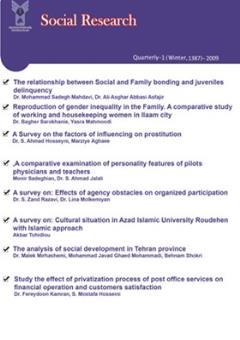Predicting Quality of Life Based on Coping Strategies and Locus of Control in Female-headed households in Hashtgerd villages
Subject Areas : Social Researches
Fereshteh modirfallah rad
1
,
Simindokht Rezakhani
2
*
![]()
1 - میدان انقلاب،جمالزاده جنوبی،کوچه دانشور
2 - میدان انقلاب،جمالزاده جنوبی،کوچه دانشور
Keywords: Keywords: Quality of life, Copying strategies, Source of control, Women heads of households, Hashtgerd.,
Abstract :
Abstract Introduction: Today, the quality of life and the factors affecting it are among the issues faced by women heads of households. The purpose of this study was to predict the quality of life of female heads of households in Hashtgard villages based on coping strategies and locus of control. Methods: The research method was a correlational descriptive method. 210 people were selected from among the female heads of households in Hashtgerd villages in April and June 2019 through available and voluntary sampling. The research tools included Weber and Sherburne's (1992) health-related quality of life questionnaires, Rezakhani's coping strategies (1388) and Rutter's locus of control (1966). Hierarchical multivariate regression analysis was performed with the help of SPSS 24 software took. Findings: Data analysis using Pearson correlation and hierarchical multivariate regression showed that locus of control is negative (p<0.01), physical and psychological dimensions of quality of life, problem-oriented strategy is positive and avoidance strategy is negative. (p<0/01) physical health dimension of quality of life; problem-oriented strategy positively and emotion-oriented strategy negatively (p<0/01) predict mental health dimension of quality of life. Also, also coping strategies and source of control can predict 13.6% of physical health variance and 28.8% of mental health variance of quality of life of the sample group. Conclusion: Based on the results of this research, in order to increase the quality of life of women heads of households, they can be supported by thinking of the necessary measures in the appropriate use of coping strategies and locus of control.

